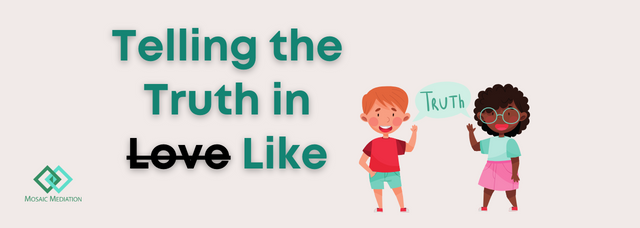Truth in Like
How to tell the truth without damaging relationships.

For many, holidays are an exciting time of year - the anticipation of special food, celebration, traditions and time with friends and family.
For others, holidays are a time of building anxiety as the holiday season gets closer and the need to interact with people whom they find it difficult to be around. And it is all well and good for well-meaning individuals to tell them to “just set boundaries” or “not accept that kind of behaviour”.
Particularly with long-standing relationships where someone really cares about the person, setting boundaries can be far more complicated than those outside the situation may fully appreciate.
It is a very difficult balance to set boundaries and communicate with full honesty, whilst not harming the relationship or unnecessarily offending the other person. There is often a desire to keep the relationship but simply change the parts about the current dynamic that have not been good.
The same can be said for workplace relationships, where the potential consequences of getting the approach wrong could potentially impact your reputation, role responsibilities, or career progression.
So, how do you ‘tell the truth in love’ (or ‘like’)?
In mediation, the aim is that people feel able to speak honestly, yet are helped to do so by the mediator, so that their truth is delivered without escalating the situation.
Unlike those who do not see an alternative to brutal honesty, there are so many ways for people to be completely honest whilst demonstrating care and respect for the other person.
The added complexity of long-standing relationships – whether family, friends, or colleagues – is that the pattern of communication and behaviour will have become ‘normalised’ and embedded. So, from the other person’s perspective, attempted changes to that may feel unnecessarily disruptive and that it has come out of the blue. So, no, it is rarely as simple as “just set boundaries”, if you want to maintain a positive relationship with them.
Assertive communication does not have to be brutal, antagonistic, nor should most situations require a ‘take it or leave it’ approach to the relationship. (And, in my experience, so-called ‘brutal honesty’ is more of an exaggeration, aiming to make a point, rather than being the full truth.)
Yes, there will be some relationships, where even the most slow and delicate of approaches is not handled kindly or reasonably by the other person. There will also be relationships where one person has no intention of respecting the healthy boundaries of another, and so some distance - or a complete retreat - may be a necessary course of action.
As someone who has successfully mediated very difficult workplace conflicts and coached a range of individuals in assertiveness, I would argue that for most situations, this is not the case.
Most people DO want those in their family, workplace, or friendship circle to feel comfortable and respected. They DO want to honour healthy boundaries of others. Yet, they may need some time and understanding to adjust to them. It may be a very unpleasant shock to hear how behaviour, which they previously believed was acceptable, no longer is.
And it may feel very uncomfortable to be perceived as someone who has hurt/offended/harmed/made someone else feel uncomfortable. We all have a narrative about ourselves, and it does not feel nice to have that narrative challenged (unless it feels positive).
If you are the person needing to be truthful, here are some things to bear in mind:
- Will this truth be a shock to them? If so, how can you gently present the concept to them?
- How will you frame the truth? (Working out how to be honest without escalating the situation is often a large part of my coaching conversations – particularly around giving feedback to employees or wanting to change a personal relationship dynamic.)
- What outcome would you like to come out of this conversation? Do you need a big change to happen now, or would it be beneficial to start with a smaller goal?
- Is there anything that might be an obstacle to this change happening?
- Boundaries are intended to demonstrate what you prefer and will accept? They are not about controlling or changing someone else. If, upon hearing the truth and understanding your boundaries, the other person chooses not to accept them, consider calmly what your next course of action could be to maintain these boundaries still?
If you are the person on the receiving end of a difficult truth or new boundaries… Here are some helpful reflection questions:
- How much do you value the relationship?
- Are these boundaries reasonable? Is this truth something you can respect – even if you don’t fully agree?
- If your automatic response is to reject this truth or boundary, reflect on whether your narrative about ‘who you are’ and your character might be influencing your response. Can you not be both a well-intentioned, ‘good’ person AND someone who is capable of causing offense and who benefits from accountability?
Even in the workplace, dealing with relationships that are not a familial or romantic ‘love’ but involve people that you do – or want to – like, the above considerations are of benefit. A relationship where healthy boundaries are understood and respected will be far more productive than one where issues are dealt with through brutal (so-called) ‘honesty’, passive-aggression, or frustrated silence.
If you want to have positive and peaceful relationships, it is very possible to tell the truth in love – or ‘in like’!
For more tips on how to communicate assertively and practical methods for having productive, honest, and peaceful conversations, got to https://resources.mosaicmediation.co.uk to access a wide range of resources. For support in developing yours or your team’s communication skills, or for advice on handling workplace conflict, go to the Contact or Services page.










